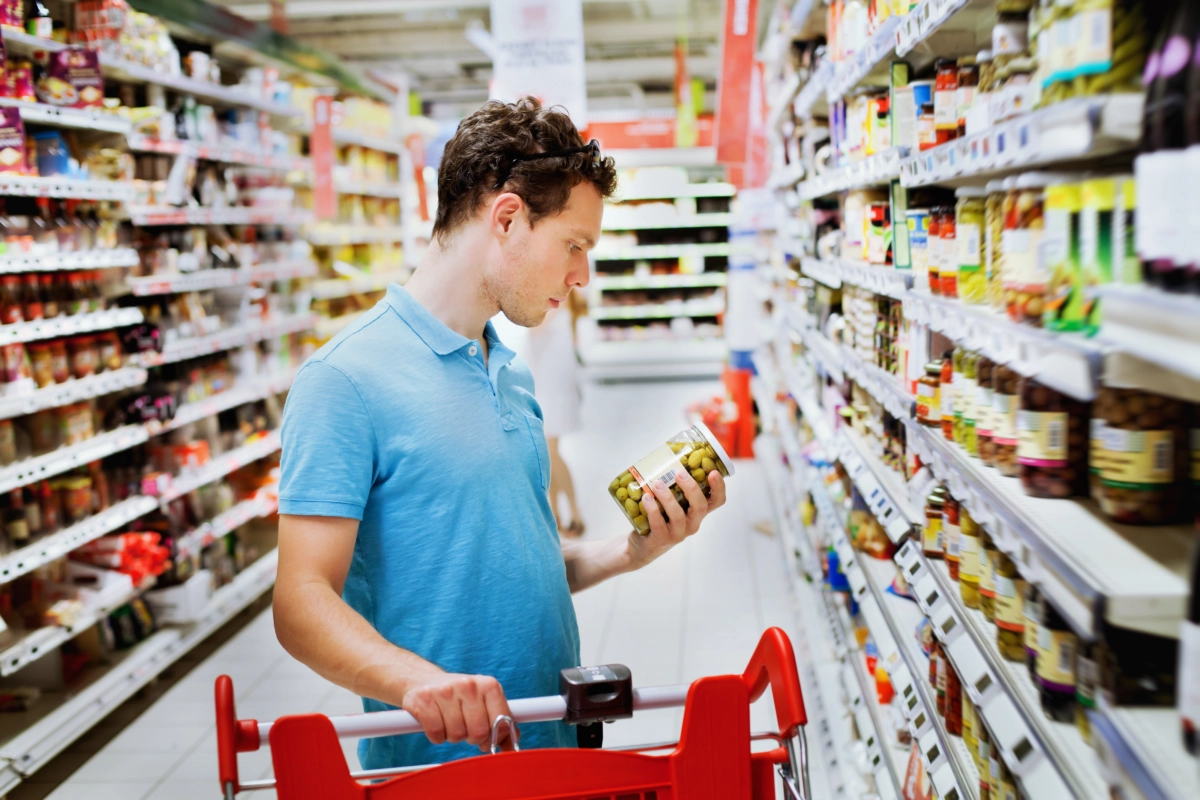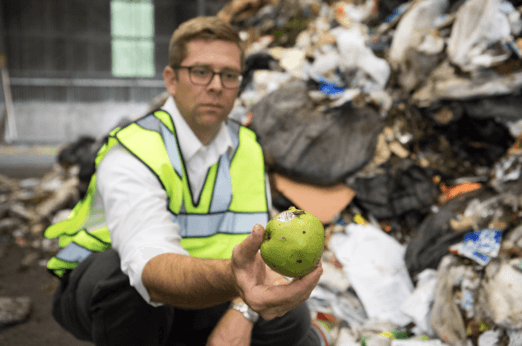Opinion: Congress Should Standardize Food Labels in Farm Bill to Curb Food Waste
Americans throw out 6.5 million tons of edible food each year. Changing the ‘best by’ labels would fix that.
Opinion: Congress Should Standardize Food Labels in Farm Bill to Curb Food Waste
Americans throw out 6.5 million tons of edible food each year. Changing the ‘best by’ labels would fix that.

by Shutterstock
Up to 40 percent of all food produced around the world never makes it to anyone’s plate—a staggering fact. As Congress works to finalize the most important piece of food legislation—the coming 2024 Farm Bill—our elected leaders have an opportunity to make real progress on food waste.
In the US, an estimated 77 million tons of food are wasted annually, even as one in eight American families struggles with hunger. Growing all that food that no one eats wastes financial and natural resources, while also contributing to climate change. Food is the number one item we throw into landfills, where it drives almost 60 percent of their methane emissions.
But there is an easy way to cut down a large portion of that food waste: Change the “best by” labeling system. According to new research by MITRE and Gallup, there are more than 50 different date label phrases in most grocery stores today—“sell by,” “use by,” “best if used by,” “enjoy by,” and so forth—leaving consumers confused about whether these terms refer to freshness, safety or other issues. As a result, one third of all consumers “often or always” throw away food that has passed its date label. The end result is that households and food businesses throw away perfectly wholesome food (6.5 million tons annually in the US, which is nearly 10 percent of all US food waste) and spend an average $1,500 a year per household on food that they then toss in the trash.
The US has set a goal to halve its food waste by 2030. To accelerate progress, the Zero Food Waste Coalition (a group of nonprofits, major food businesses and communities) has come together to help advance two commonsense pieces of bipartisan legislation: the Food Date Labeling Act (FDLA) and the NO TIME TO Waste Act. Congress should pass both these acts in the upcoming Farm Bill.
The FDLA aims to establish a consistent, easy-to-understand food date labeling system, at no cost to the government. The FDLA would streamline food labeling into two simple categories: “Best If Used By” to communicate peak food quality and “Use By” to indicate the end of a product’s estimated shelf life. Most importantly, the act would launch an education campaign to help consumers understand the difference between these categories.
Simplified date labels are one of the most cost-effective strategies to reduce food waste across the supply chain—with the majority of the benefits going to consumers. The FDLA would also make more food available for donation by clarifying that food can still be donated after a quality date (which 20 states prohibit or restrict today). More than 23 industry leaders, such as Walmart and Unilever, have signed on in support of the FDLA.
In addition to the FDLA, the NO TIME TO Waste Act would establish an Office of Food Loss and Waste at the US Department of Agriculture. This office would spearhead a whole-of-government approach to reducing food waste, strengthen food waste research, create consumer awareness campaigns and support public-private partnerships and local food recovery efforts.
These two pieces of legislation are a no-brainer for Congress to pass. Tackling food waste is good for consumers, businesses and the environment. Meeting our national goal of reducing food loss and waste by 50 percent would deliver a $73-billion annual net financial benefit (again, in large part to consumers), reduce greenhouse gas emissions by 75 million metric tons and create 51,000 jobs over 10 years. The 2024 Farm Bill is a golden opportunity to make meaningful progress in our fight against food waste, help families stretch their limited food dollars and transition to a more efficient and sustainable food system.

Pete Pearson is senior director of food waste with World Wildlife Fund in Washington, D.C.
The Zero Food Waste Coalition aims to inform and influence policy at the local, state and federal levels and share policy updates and opportunities with partners and stakeholders around the country to bring consumers, businesses and government together to make food loss and waste history. The Coalition was launched by NRDC, WWF, ReFE, and FLPC in April 2023, formalizing a partnership that began in January 2020.
Follow us
This work is licensed under a Creative Commons Attribution-NoDerivatives 4.0 International License.
Want to republish a Modern Farmer story?
We are happy for Modern Farmer stories to be shared, and encourage you to republish our articles for your audience. When doing so, we ask that you follow these guidelines:
Please credit us and our writers
For the author byline, please use “Author Name, Modern Farmer.” At the top of our stories, if on the web, please include this text and link: “This story was originally published by Modern Farmer.”
Please make sure to include a link back to either our home page or the article URL.
At the bottom of the story, please include the following text:
“Modern Farmer is a nonprofit initiative dedicated to raising awareness and catalyzing action at the intersection of food, agriculture, and society. Read more at <link>Modern Farmer</link>.”
Use our widget
We’d like to be able to track our stories, so we ask that if you republish our content, you do so using our widget (located on the left hand side of the article). The HTML code has a built-in tracker that tells us the data and domain where the story was published, as well as view counts.
Check the image requirements
It’s your responsibility to confirm you're licensed to republish images in our articles. Some images, such as those from commercial providers, don't allow their images to be republished without permission or payment. Copyright terms are generally listed in the image caption and attribution. You are welcome to omit our images or substitute with your own. Charts and interactive graphics follow the same rules.
Don’t change too much. Or, ask us first.
Articles must be republished in their entirety. It’s okay to change references to time (“today” to “yesterday”) or location (“Iowa City, IA” to “here”). But please keep everything else the same.
If you feel strongly that a more material edit needs to be made, get in touch with us at [email protected]. We’re happy to discuss it with the original author, but we must have prior approval for changes before publication.
Special cases
Extracts. You may run the first few lines or paragraphs of the article and then say: “Read the full article at Modern Farmer” with a link back to the original article.
Quotes. You may quote authors provided you include a link back to the article URL.
Translations. These require writer approval. To inquire about translation of a Modern Farmer article, contact us at [email protected]
Signed consent / copyright release forms. These are not required, provided you are following these guidelines.
Print. Articles can be republished in print under these same rules, with the exception that you do not need to include the links.
Tag us
When sharing the story on social media, please tag us using the following: - Twitter (@ModFarm) - Facebook (@ModernFarmerMedia) - Instagram (@modfarm)
Use our content respectfully
Modern Farmer is a nonprofit and as such we share our content for free and in good faith in order to reach new audiences. Respectfully,
No selling ads against our stories. It’s okay to put our stories on pages with ads.
Don’t republish our material wholesale, or automatically; you need to select stories to be republished individually.
You have no rights to sell, license, syndicate, or otherwise represent yourself as the authorized owner of our material to any third parties. This means that you cannot actively publish or submit our work for syndication to third party platforms or apps like Apple News or Google News. We understand that publishers cannot fully control when certain third parties automatically summarize or crawl content from publishers’ own sites.
Keep in touch
We want to hear from you if you love Modern Farmer content, have a collaboration idea, or anything else to share. As a nonprofit outlet, we work in service of our community and are always open to comments, feedback, and ideas. Contact us at [email protected].by Pete Pearson, Modern Farmer
April 22, 2024
Modern Farmer Weekly
Solutions Hub
Innovations, ideas and inspiration. Actionable solutions for a resilient food system.
ExploreExplore other topics
Share With Us
We want to hear from Modern Farmer readers who have thoughtful commentary, actionable solutions, or helpful ideas to share.
SubmitNecessary cookies are absolutely essential for the website to function properly. This category only includes cookies that ensures basic functionalities and security features of the website. These cookies do not store any personal information.
Any cookies that may not be particularly necessary for the website to function and are used specifically to collect user personal data via analytics, ads, other embedded contents are termed as non-necessary cookies.
All good, but my thought is we live, many of us, in a spend mode. We buy more food than we consume — our eyes and our wallets are bigger than our stomachs. Do vagrants go to dumpsters in poor neighborhoods? What ever happened to garbage disposals under the sink? The phrase “Waste not, want not” goes back to the 1930s. As does the voice of the mother telling her child who refuses to eat what is on his (my!) plate: ” The children in China are crying for it.” Solving the food waste problem is doable if you put… Read more »
I see food being wasted every day in supermarkets. Hopefully the government will soon have a solution.